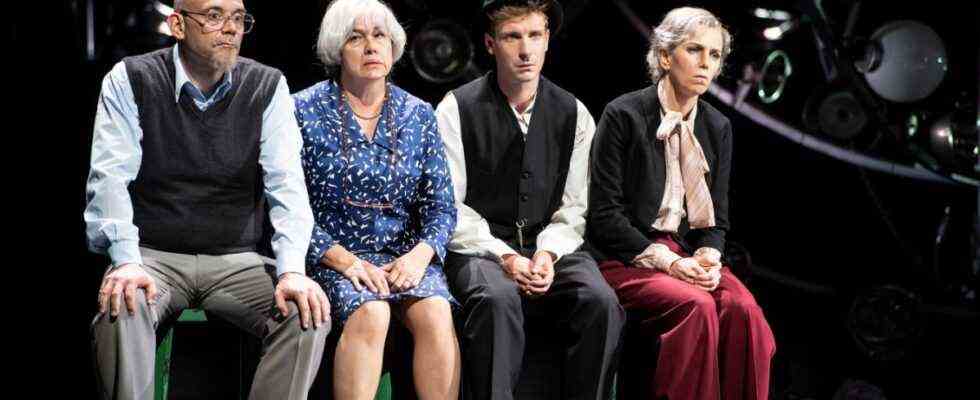After five hours, that’s how long this performance lasts with two breaks, Judith Herzberg herself comes onto the stage of the Munich Residenztheater. The writer, born in Amsterdam in 1934, seems almost shy, also a little touched by the grateful applause that was due first to the ensemble, then to the director, i.e. Stephan Kimmig, and now finally she is celebrating, the creator of the three plays that the evening includes united under the title “The Dreams of the Absent”. There are three wonderful pieces, a family panorama, rich in characters that only Herzberg could invent: a Jewish life story spanning three generations, in which the dead play a role and the many living struggle with life itself, celebrate it, fall in love, to fall in love with each other. Herzberg’s trilogy is a tableau of Jewish life and survival, over which the black cloud of the Holocaust always hangs. But it is also a great epic about what it actually is, this life.
Herzberg wrote the three pieces over a period of 20 years, between 1981 and 2001. The first, “Lea’s Wedding”, is a unique masterpiece in itself. Lea is getting married for the third time, you are in Amsterdam in 1972 and the play is full of little stories that you have to watch out for because they often wander around in the background, hiding between the words that you change at a wedding with countless relatives . Lea is the daughter of Ada and Simon, who survived the concentration camp, while Lea grew up as a child with Riet, the non-Jewish “war mother”. Herzberg himself survived the war with foster parents in the country. But she is not Lea. Herzberg: “But all the characters have parts of me.” Her father survived the Bergen-Belsen concentration camp and wrote a book about it.
The piece about the wedding, which by no means spins all the threads of life together, leaves loose ends that the viewer can tie together – what a wonderful experience when you feel the characters in your own head – follows “stitching thread”, similar in structure. The characters are pursued, new ones are added until everything comes to a close, on “Simon”, on the death of the generation that was the last to survive the Holocaust. You have arrived at a time that can also be imagined as our present.
You have to live life forward. But to understand it you have to go back
Stephan Kimmig occupied himself with the subject as long as Herzberg did. 20 years ago he staged the first two plays together in Stuttgart, ten years ago he brought out the entire trilogy at the Deutsches Theater in Berlin. At that time it was called “Über Leben”, and if memories are not deceptive, a lot was very different then from what it is today in Munich. A very fine, precise evening is remembered, which carefully follows Herzberg’s chronology.
Now, ten years older, Kimmig first puts Simon on the stage, played by the enigmatic shimmering Steffen Höld, in a wheelchair, old, demented, decaying. You have to live life forward, but to understand it you have to go back. The evening ends with the grandchildren, with Xandra and Chaim, Linda Blümchen and Niklas Mitteregger, with their physically exploding anger, with their attempt to break out of this circle of life, in which one repeatedly comes across the past, but also with theirs Jewish self-confidence.
Kimmig only needs the light installations by Gerrit Jurda as equipment; the hybrid structures awaken to glowing and glowing life through Max Rothbart. Rothbart is the inventor of the world here, a magician like from children’s theater, also a music and noisemaker. Kimmig is not always subtle, the feeling is sometimes controlled with the slow movement from Schubert’s string quintet or there is a lot of party with the sound of the seventies.
A play about Jews, only with Jews? That is not possible, otherwise one must not have bad qualities. Yes, they can.
Much more decisive, however, is this 15-person ensemble, which plays great, horizontally in the encounters of the characters with one another, vertically in aging, in the change in their own physique and emotionality. Three fixed points: Simon, his wife Ada, played with a huge heart by Barbara Horvath, and Lea. The fact that she survived the Holocaust weighs on Ada, six million not, she moves into her own world, dies and returns as a spirit, a physical image of remembrance. Liliane Amuat plays Lea with a flickering unrest, charged with a vibrant interest in creating a life of her own. At their wedding with Nico, played by Thomas Lettow with Hollywood grandeur that has been carefully crumbling over the years, Hans, a friend of Nico, and Pien get to know each other. And since family stories are always full of comedy, Lukas Rüppel and Lisa Stiegler court each other with wonderful absurdity; she then becomes an expert in Jewishness, he disappears and comes back rich.
There are so many stories and their embodiment here that you can’t begin to recount them. There is the touching Carolin Conrad and the completely fearless Robert Dölle, there is Hanna Scheibe. She plays Riet. Terrific. With naive wonder she moves from one faux pas to another, an example: A play about Jews, only with Jews, that doesn’t work, because if everyone is Jewish, one shouldn’t have bad qualities.
Yes, they can. This is life. And you have to play Herzberg’s pieces again and again in Germany. You are a Dutch story. And German past, present.

